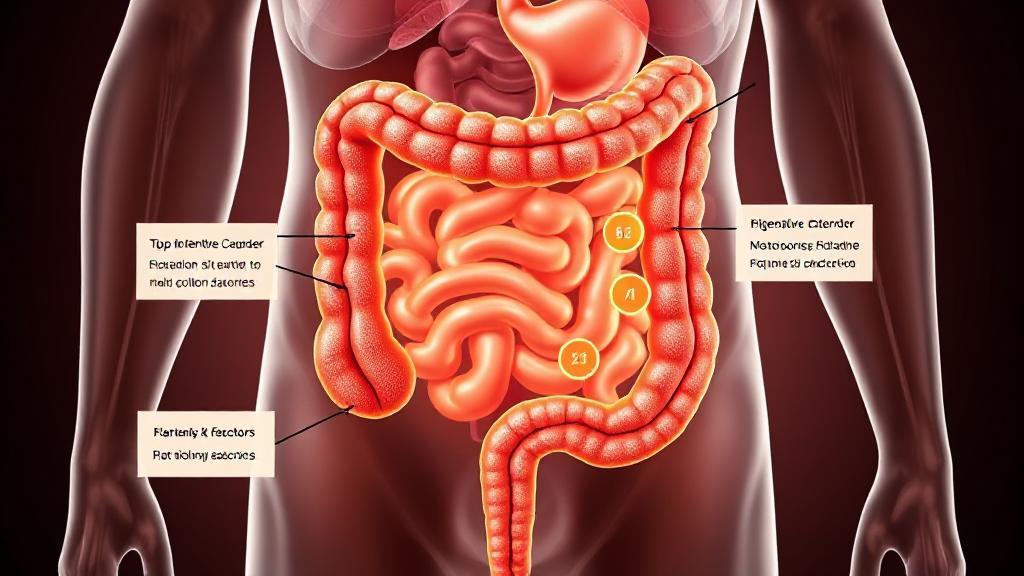What is Colon Cancer?
Colon cancer, also known as colorectal cancer, is a type of cancer that begins in the colon or rectum. It typically starts as small, noncancerous clumps of cells called polyps that form on the inside of the colon. Over time, some of these polyps can become cancerous. Regular screening tests can help identify and remove polyps before they turn into cancer.
Risk Factors
Age and Gender Considerations
The risk of colon cancer increases significantly with age. Key statistics show:
- 90% of cases occur in people 50 or older
- The average age at diagnosis is 68 for men
- The average age at diagnosis is 72 for women
Genetic and Family History
Having a family history of colon cancer or polyps significantly increases risk. Specific inherited conditions include:
- Lynch syndrome
- Familial adenomatous polyposis (FAP)
- MUTYH-associated polyposis
- Peutz-Jeghers syndrome
Diet and Nutrition
Diet significantly influences colon cancer risk:
Risk-Increasing Foods
- Processed meats
- Red meat
- Heavily fried foods
- Alcohol
Protective Foods
- High-fiber vegetables
- Fruits
- Whole grains
- Foods rich in calcium
Lifestyle Factors
- Physical Inactivity: A sedentary lifestyle can increase the risk of colon cancer
- Obesity: Being overweight or obese is linked to a higher risk
- Smoking: Long-term smokers are more likely to develop and die from colon cancer
- Alcohol: Heavy alcohol use is associated with an increased risk
"Regular physical activity not only helps maintain a healthy weight but also reduces the risk of colon cancer by up to 24%." - American Cancer Society
Medical Conditions
Several medical conditions can increase colon cancer risk:
- Inflammatory Bowel Disease (IBD)
- Ulcerative colitis
- Crohn's disease
- Long-term inflammation of the colon
- Type 2 Diabetes
- Previous radiation therapy to the abdomen
Causes of Colon Cancer
While the exact cause is not fully understood, several factors contribute to its development:
Genetic Mutations
Mutations in certain genes can lead to uncontrolled cell growth in the colon. These mutations can be inherited or acquired over a person's lifetime.
Inflammation
Chronic inflammation in the colon, often due to conditions like IBD, can lead to changes in the cells lining the colon, increasing cancer risk.
Infection
Certain infections, such as Helicobacter pylori (H. pylori), can increase the risk of colon cancer.
Screening Recommendations
| Age Group | Screening Frequency |
|---|---|
| 45-75 years | Every 10 years (colonoscopy) |
| 76-85 years | Individual decision based on health |
| 85+ years | Screening not recommended |
Prevention Strategies
- Regular screening after age 45
- Maintaining a healthy diet rich in fiber
- Regular exercise
- Limiting alcohol consumption
- Avoiding tobacco
- Maintaining healthy weight
For more detailed information, visit the National Cancer Institute, American Cancer Society, or Centers for Disease Control and Prevention.
